Here are the Printz winners for 2018, with We Are Okay as the Winner.
The Michael L. Printz Award, a View from the Inside by Melanie Koss
It all starts over a year before, when committee members are elected and appointed, and the chair is determined. Committee members are librarians and educators across America. They come from different places, span different ages, and all have different backgrounds. Introductions are made. Initial phone calls are had. A group Google Hangout takes place. The committee gets to know one another and plans are made. The excitement and fear is palpable, but the committee members are ready to go!
At the first meeting, after introductions and housekeeping was taken care of, the nitty gritty began. How would we manage ALL THE BOOKS? What procedures would we all follow? How does a committee of nine select the “best book written for teens, based entirely on its literary merit”? What does that even mean, “best book”? That was something we needed to come together to find out.
But you’re asking, how does it really work? How do you read all of the books? How do you decide? Obviously, every committee member could not possibly read all the books? While each committee has a different work flow and procedures, here’s what my committee did.
Next, finding the books. Yes, many publishers choose to send committee members books they believe have literary merit to make sure that the committee sees them. But we couldn’t sit back and wait for the books to come to us. We actively searched bookstores and publisher catalogs, asked friends for recommendations, and kept an eye and ear out for any likely titles. The Printz Award targets books from ages 12-18, and the guidelines are that the book must be published in America in English for the first time. An eligible title might have originally come out in another country or another language in a previous calendar year, but it was eligible for the Printz only when it was first published in the U.S. We had to find those books!
Nominations. Any committee member can read and nominate any title, regardless of whether or not they were the assigned reader. If a book is nominated, every committee member must read it and it must be on the table for deliberation.
Prior to ALA Midwinter, the second time we met in person and the conference at which the winners were determined, we held straw polls to get a sense of the books people were feeling very strongly about. Books were read and reread, notes were compiled, rubrics were filled out, and thoughts were gathered. Finally, it was time to enter the deliberation room and make our decisions.
Eventually, after many hours of debate, the pool was small enough that we were ready to take a paper ballot to choose our winner. The Printz policies and procedures guide has specific voting guidelines. We vote for our top three choices, and each is assigned a point value. A book must receive five first place votes and earn at least five more points than the second-place title. Discussion and balloting continues until a winner is chosen. Much rejoicing is had! But our work was not yet done. We had to decide, as a committee, if we wished to select any honor books. We could select up to four honor books, and any book nominated was eligible to receive an honor medal. Every book was back on the table! Books we might have eliminated as not having the qualities to be our official winner might have the merit to win an honor. The process began again. A straw vote was conducted of all nominated titles. Any title receiving no votes was removed from contention. Then, a formal, weighted paper ballot was conducted, and the honor books were decided upon based on the result of this ballot. We had four honors, and looking across our titles we were thrilled to see we had a mix of genres, cultures, and genders represented in our winning titles and authors. Not intentional on our parts, but exciting to see nonetheless.
Our work was not yet done, but the next part was fun part. We got to put the stickers on the winning books! We all cheered as I placed the shiny gold sticker on our winning title, March: Book Three. The cheers continued as I placed a shiny silver sticker on our honor books, Asking for It, The Passion of Dolssa, Scythe, and The Sun is Also a Star. Finally, with the help of committee members, I filled out the forms and wrote annotations for our winners. It was time to sleep and celebrate.
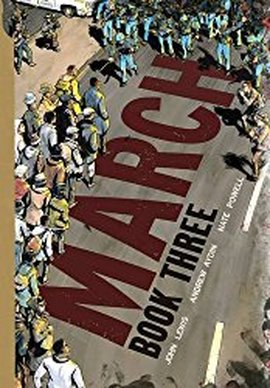
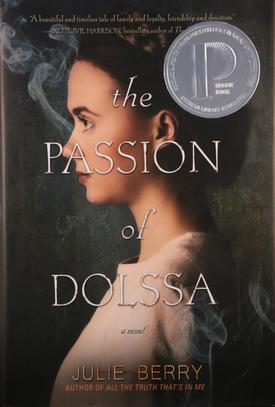
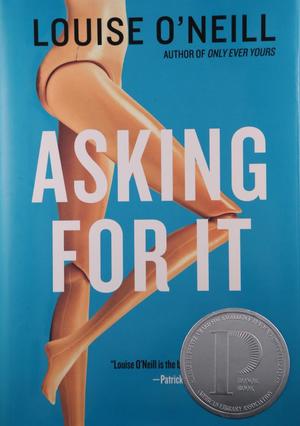
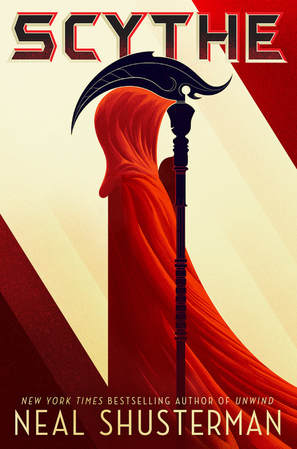
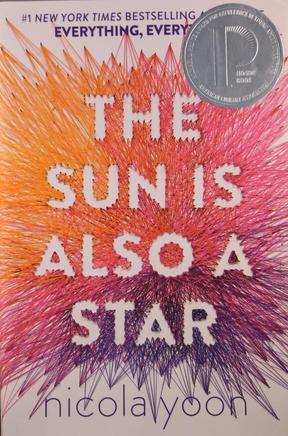

 RSS Feed
RSS Feed